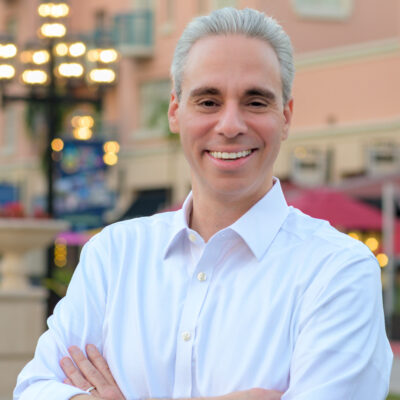
Win McNamee/Getty Images
Montana Senate race to test influence of GOP establishment in key battleground state
Tim Sheehy, backed by Republican leadership, launched his Senate campaign on Tuesday, setting the stage for a potentially bruising intraparty clash
The battle for a key Senate seat in Montana appears to be headed for a bitter primary clash between a hard-right congressional firebrand and a political newcomer handpicked by GOP leadership.
Tim Sheehy, a businessman and former Navy SEAL officer, launched a widely expected Senate campaign on Tuesday, setting the stage for a potentially bruising showdown with Rep. Matt Rosendale (R-MT), a combative conservative who has indicated that he is plotting his own bid.
In an increasingly familiar scenario, the hypothetical primary matchup would pit an establishment favorite — albeit one with no experience in electoral politics — against a two-term incumbent who has defied Republican leadership while stirring controversy for his engagement with right-wing extremists.
The race to challenge Sen. Jon Tester (D-MT), a vulnerable three-term incumbent who defeated Rosendale in 2018, promises to be among the most closely watched Senate contests of the 2024 election. Not only could the race determine the balance of power in the upper chamber, but it could test the influence of the GOP establishment in primary campaigns — particularly in the wake of an election cycle in which party leaders struggled to recruit winning Senate candidates in a handful of pivotal races.
The primary is also a personal test for the leader of the Senate Republicans’ campaign arm, Sen. Steve Daines (R-MT), who encouraged Sheehy to run. Immediately after Sheehy announced his campaign on Tuesday, Daines, a former Montana congressman, gave his endorsement to the fledgling candidate, wasting no time in his effort to consolidate support before the field widens. His nod was soon echoed by Sen. Tom Cotton (R-AR), and more endorsements from top Republican lawmakers are likely to follow as the campaign unfolds, according to a source familiar with the race.
Rosendale, for his part, claimed to be unintimidated, even as he fell short of clarifying his own plans. “Congratulations to Mitch McConnell and the party bosses on getting their chosen candidate,” he declared in a series of barbed tweets on Tuesday. “Now Washington has two candidates — Tim Sheehy and Jon Tester — who will protect the DC cartel. Unfortunately for them, Montanans don’t take orders from Washington.”
In a campaign kickoff video, Sheehy, 37, cast himself as part of a new generation of traditional conservative leaders, recalling his decision to join the military in the aftermath of the September 11 attacks. In 2014, he left the Navy and settled in Montana, where he is the co-founder of a successful aerial firefighting company. “Whether it was in war or business, I see problems and solve them,” he said, while adding that his campaign “is about service, God and country, not politics as usual.”
Sheehy, who is independently wealthy, will be capable of self-funding — a key selling point for Republican recruiters. Meanwhile, establishment GOP donors indicated that they are eager to back the new candidate over Rosendale, who angered Republicans when he opposed Rep. Kevin McCarthy’s (R-CA) bid for the speakership in January.

“The first question we have to ask ourselves is, do the Republicans want to win in Montana or lose?” Eric Levine, a top Republican donor in Manhattan, said in an interview with Jewish Insider on Tuesday. “If they want to lose, they’ll nominate Matt Rosendale, who is a Trumper and an extremist and one of the one of the five nutcakes who would not vote for Kevin McCarthy for speaker. If they want to win, they’ll nominate and back Sheehy.”
According to Levine, the donors he regularly speaks to “wish Rosendale would just go away” and “remain really, really angry about his failure to vote for Kevin McCarthy.” He dismissed a recent poll showing Rosendale, who represents the eastern half of Montana, with a substantial lead over his potential primary opponent, suggesting it was simply too early to draw any firm conclusions.
Even without support from some major donors, Rosendale, 62, could receive a boost from the ultraconservative Club for Growth, which backed his first Senate campaign five years ago. But the congressman, who pulled in a meager $127,000 last quarter, is trying to improve his fundraising as he weighs a rematch. Two top Republican donors who live outside the state said he has persistently solicited campaign contributions from them, even as his requests have gone unheeded.
“He pings me all the time,” one donor in Chicago told JI, noting that he is more enthusiastic about Sheehy’s campaign. “I’ve never talked to him,” he said of Rosendale, who previously served in both chambers of the Montana legislature as well as state auditor. “But I know his name because he reaches out a lot.” Another donor, in Texas, estimated that Rosendale has called him “15 times” — overtures he has “avoided,” he said, because he has not yet begun closely following the primary.
Rosendale could not be reached for comment regarding his plans for the race.
While Sheehy is relatively unknown to voters and has yet to define his positions on a range of issues, there are some areas where he can be expected to draw a distinct contrast with Rosendale — perhaps most prominently on foreign policy. The congressman is an isolationist who has staunchly opposed U.S. funding for Ukraine, whereas Sheehy seems to be in favor of backing the war-besieged country, according to past posts published on his LinkedIn page.
In some instances, Sheehy appears to have advocated for an unusually aggressive response to Russia’s invasion. “Sweden and Finland are next? We’ve seen this movie before….stop him now before the price tag for putting Putin down will be a lot higher,” he wrote in one post a year ago, referring to Russian President Vladimir Putin. “Georgia, Crimea, Syria, now Kiev — then what? Estonia? Finland? Sweden? Gofund me pages and twitter likes aren’t enough. Soldiers, planes, bombs and bullets will be needed against this Tyrant.”
A spokesperson for Sheehy’s campaign did not respond to a request for comment from JI on Tuesday.
Despite such differences, Rosendale’s foreign policy doctrine has in some ways resisted easy classification. He is, for example, broadly supportive of Israel, even as he frequently aligns with a libertarian-leaning House colleague, Rep. Thomas Massie (R-KY), who has opposed supplemental funding for Israel’s Iron Dome missile-defense system and consistently votes against pro-Israel legislation.
“Matt Rosendale has on file at AIPAC a positive position paper on the American and Israel friendship,” Jerry Weissman, a former executive board member at AIPAC who lives in Montana, said in a text message to JI this week. “I have not seen anything he has said or done to change that position.”
Weissman said he was unaware of Sheehy’s positions on Israel. “I will seek him out and see what he is or is not,” he confirmed. Jewish Republican donors, who were likewise unfamiliar with Sheehy’s approach to Middle East policy, said they did not expect any surprises from the candidate.
During the last election cycle, Rosendale was among a sizable group of congressional lawmakers to earn an endorsement from AIPAC’s political action committee. But he was not included in its first round of 2024 endorsements, released in March. The reason, according to a source familiar with the process, was that AIPAC had expected that he would run against Tester, and its members did not want a House endorsement to be misapplied to his Senate bid.
The pro-Israel lobbying group, which is bipartisan, has backed Tester’s campaign for another term — in keeping with a long-held practice of supporting so-called “friendly incumbents” up for reelection. The source clarified that AIPAC would likely have supported Rosendale if he were running for Congress again.
Marshall Wittmann, a spokesperson for AIPAC, declined to comment.
Meanwhile, the Republican Jewish Coalition, whose political arm has previously endorsed Rosendale, is unlikely to weigh in on the Senate primary, according to a person familiar with the group’s thinking. The RJC has rarely engaged in primaries, with the exception of some races in which it opposed candidates who had been accused of espousing antisemitic views, including Rep. Marjorie Taylor Greene (R-GA).
That Rosendale has occasionally drawn criticism for associating with right-wing extremists does not seem to have been a major source of concern for Jewish Republicans. In March, for instance, he came under scrutiny for appearing in a photo with two prominent neo-Nazis outside the Capitol. The congressman later claimed he had done so unwittingly and was “not aware” of their views when he was asked to pose with them.
“I absolutely condemn and have zero tolerance for hate groups, hate speech and violence,” Rosendale told a local newspaper in Montana, stressing that he “did not take a meeting with these individuals.”
Chaim Bruk, a Chabad rabbi in Montana who has known Rosendale for years and appreciates his outreach, said he trusted the congressman’s explanation. “I have no reason to believe, based on my engagement with him over 10 years, that he has an antisemitic or white supremacist bone in his body,” he told JI. “That being said, as a rabbi, I know people should be more careful who they take photographs with.”






